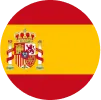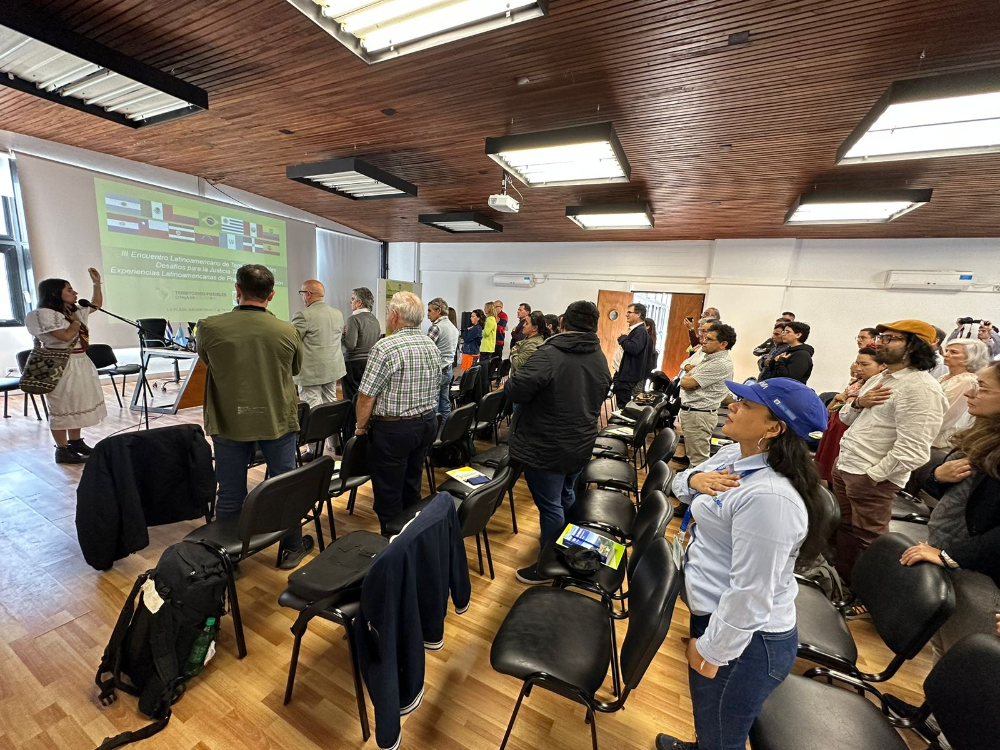Codazzi, Cesar. April 24, 2023. AGROSAVIA participated in the III meeting of possible territories held in La Plata, Argentina, from April 17 to 19. AGROSAVIA's participation in this scenario is meaningful because, given its 30 years of creation, the evolution of its knowledge model is presented internationally, keeping the Corporation at the forefront of technological linkage. The researchers of the Vegetables Network, Yanine Rozo from the Palmira Research Center and Adriana Tofiño from the Motilonia Research Center, presented the results of the ocañera onion, biofortified bean, and drought agenda projects. The III meeting of possible territories was organized by the Latin American Scientific Network "Possible Territories, Praxis and Transformation" of Instituto de Investigaciones en Humanidades y Ciencias Sociales (IdIHCS, CONICET-UNLP) and Universidad Nacional de La Plata (UNLP). The event's opening was in charge of the Vice President of Scientific Affairs of CONICET, Mario Pecheny. Delegations from Spain, Mexico, Brazil, Peru, Ecuador, Uruguay, and Argentina participated in the event. The most remarkable aspect of the event was that not only researchers participated but also companies with social responsibility and ethnic and popular leaders.
Mario Pecheny outlined, "From the natural and technological disciplines, we can contribute to resolving specific problems in small-, medium- and large-scale territories. From the public university and science, it is important to support these articulations showing how it is possible to build knowledge with social actors and local governments collectively."
The meeting topics focused on managing the territory with territorial justice, human economy, and socio-ecological transition perspectives for achieving fairer and more sustainable territories. CONICET's Researcher Horacio Bozzano, a member of the organizing committee of the event, explained that the scope of sustainable territories requires the setting of common objectives of the actors that come together in the territory, such as "articulate productions of the social, exact and natural sciences in which, from the beginning of the research, the identities and needs of the most forgotten social groups and the most mistreated environments are heard, recorded, analyzed and interpreted, evidently with the support of inclusive public policies in the most socially and environmentally vulnerable territories." Concerning this objective, the results of Participatory-Action-Research projects and the concrete application of the Popular Science Agendas-PSA to bring science closer to communities and promote more inclusive public policies were presented. Among these, the presentations on the impacts of community universities, the cultural tourist routes projected by communities, and the blue agave seen as a product and practice in Mexico, stand out.
Horacio Bozzano, CONICET researcher and organizing committee member, declared, "Now, the communication of science and innovation in a simple language is part of the equity in an inclusive society where peasants and popular movements are true participants in discussions and decision-making. Only then can we get off the radar of the geographies of miseries."
During the event, the honoris causa doctorate promoted by the Board of Directors of the Faculty of Humanities and Educational Sciences of Universidad Nacional de La Plata was awarded to Vice President Francia Márquez Mina for her activities in defense of Afro-descendant communities and women. Two books, "Geographies of Love, Power and Misery" and "Guidelines for a Hybrid Methodology for the Scientific-Technological Linkage of the Ancestral Peoples of Colombia," were also released by Editorial AGROSAVIA.
According to Antonio José López López, the main author of the book published by Editorial AGROSAVIA, the document presents the concrete experience of AGROSAVIA with the ancestral communities of Sierra Nevada de Santa Marta-SNSM, in Colombia —Koguis, Arhuacos, Wiwas, and Kankuamos— attempting to harmonize knowledge and join efforts that allow them to approach innovative agricultural practices without altering their worldview or culture. The search for a hybrid methodology for such purposes starts from the premise that affirms that new innovative agricultural knowledge is only achieved in these communities through the healthy exchange of knowledge under the mantle of the Law of Origin and the Safeguarding Plan that governs the path to "good living," and the autonomy and independence in the management of the reservation.
The Corporation also presented three papers. M.Sc. Researcher Yanine Rozo participated in Symposium Three. Territorial justice, worldviews and territorialities, with the presentation "Construction of a Territorial Model for the Ocañera Onion" showing the most relevant results of the regional royalty system project of Norte de Santander. In this presentation, the territorial configuration in the province of Ocaña, in Norte de Santander, Colombia, from the cultivation of the native ocañera onion as a product and practice, and the impact of the mutation towards the Peruvian onion on it between 1990 and 2020 to generate a Multidimensional Territorial-Agroproductive Model for the analysis of the territorial configuration that produces crops and small-scale agricultural practices were highlighted.
The Ph.D. Senior Adriana Tofiño participated in Symposium Four. Human Economy, Culture and Possible Territories, with the presentation "Hybrid Methodology for the "Good Living" of Ancestral Peoples," research results of the project obtaining drought-tolerant bean varieties financed by KOLFACI.
Additionally, a stand was mounted for the basket of products that have been subject to territorialization by the beneficiary communities who, in the case of the biofortified bean AGROSAVIA rojo 43, offered creamy and fried beans under the Numumuke kia brand of the Arhuaca Umuriwa community with labels designed through the High Iron Bean Project financed by FONTAGRO. Another product exhibited was the sweet potato Aurora with snacks from the Batatita fit entrepreneurship and Arracacha las 22 with snacks from the arracacha producer association of Cajamarca-ASOARRACACHOS. The banners of the high-impact projects financed by KOLFACI and FONTAGRO were exhibited thanks to the transdisciplinary approach that facilitates the entrenchment of varieties by communities.
Finally, the paper "The Knowledge Model in Innovation Networks: Route to Equity in Conflict Territories in Colombia" was presented in the Twinning Networks Table. This document suggests that due to its National Research Center nature, the Corporation has undergone a significant transformation from the previous CORPOICA towards its emergence as AGROSAVIA, permeating complex approaches with a value network scope to respond to the prioritized demands of the communities and the consumer.
These activities together demonstrate the progress and approaches that the Corporation has to its credit to respond to the challenges of productive transformation that the country so much requires so that sustainable territories are not a utopia in Colombia but a reality with access to the Colombian reticular territories.
- More information here:
- Rodrigo Tofiño Rivera
- Communications, Identity and Corporate Relations Professional
- Research Center Nataima
- Communications, Identity and Corporate Relations Advisory Office
- rrofino@agrosavia.co
- AGROSAVIA





